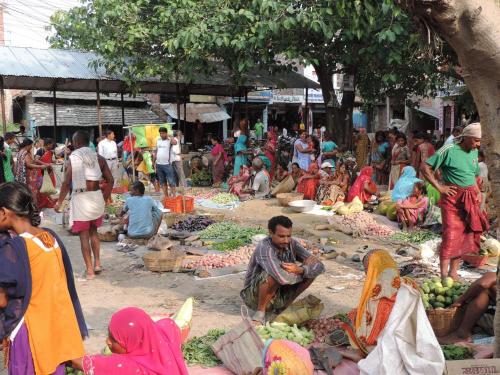
I’m spending some time in the Terai, specifically in Siraha, and I’ve been able to attend a number of haat bazars. The rainbow of colors primarily from women wearing traditional saris is like candy for my eyes. The weighing of produce with, e.g. 1 kg. stones is something that I’ve never experienced before. The number of children who have never met a bideshi, following me around the market, makes me feel somewhat alien, but a haat bazar is the definition of buying and supporting local. Supporting a market makes economic sense in that this helps to grow/maintain the local economy. In the US vendors spend hours setting up and taking down their weekly market stands, but shopping at a haat bazar is the normal practice, something which has occurred for generations. Haat bazars are also a perfect place to develop partnerships.
The number of vendors at haat bazars, even in small villages is astounding to me. Many sell the same type of produce or spices or snacks, some consumer goods, but never-the-less, numerous people, primarily women, are contributing to their family’s livelihood from the various weekly markets. At least in my eyes, in terms of gender, this should help to elevate women’s community status even if only for the market day, as a major source of contributing to a family’s well-being.
Although I haven’t asked, my hunch is that the vendors come from the local area, meaning that neighbors are supporting neighbors in helping each other to put locally grown food on their tables and with the money earned maybe, e.g. helping to pay school fees for their neighbor’s children. This seems to be the ultimate in community building.
Going further I’ve noticed that the stores located in the Village centre also benefit from the tremendous amount of traffic generated by a market, providing further local community economic benefit. Neighbors are able to meet up with neighbors, children can hang out with their friends in a very community minded environment.
I could see a village centre being renovated so that there wasn’t so much dust and comfortable space for the producers, and the haat bazar expanding to bringing in more products produced by local entrepreneurs. As an example in walking through villages I’ve noticed people making baskets and tree protectors out of bamboo. I asked some producers where their products were sold and they said Kathmandu/Pokhara; the baskets being especially made for tourists. But could these same baskets, be made not so ornate, and also sold locally or sold on the main road so that cars/people passing by might also buy these same baskets? I’ve noticed that people’s drinking water is on the whole, fairly poor. Could a local entrepreneur develop and/work with an NGO that is supplying water filters and sell this at a market? What about local NGOs, government offices, doctors, nurses, health workers also setting up stalls and providing information on creating greater health awareness, e.g. eliminating smoking, open defecation. How about providing examples of smokeless stoves, which people could either construct or purchase or demonstrating how to produce briquettes from recycled products found in the village and its environs. What about corporates, e.g. toothpaste or shampoo makers, giving out free packets so that people can try their products. Banks could participate in helping people to open up accounts through mobile banking. This would most likely lead to higher sales and could open up new markets.
The possibilities of partnering at a local market are extraordinary. Once can see this occurring at markets in Kathmandu, e.g. the 1905 Restaurant or Yellow House where a number of NGOs have stalls. In rural areas there is also the possibility, as noted above, for a variety of sectors, e.g. government, corporates, NGOs to come together to build on the community created by local markets. All that this would take would be communication and a willingness on the part of all parties to be innovative.










Add new comment